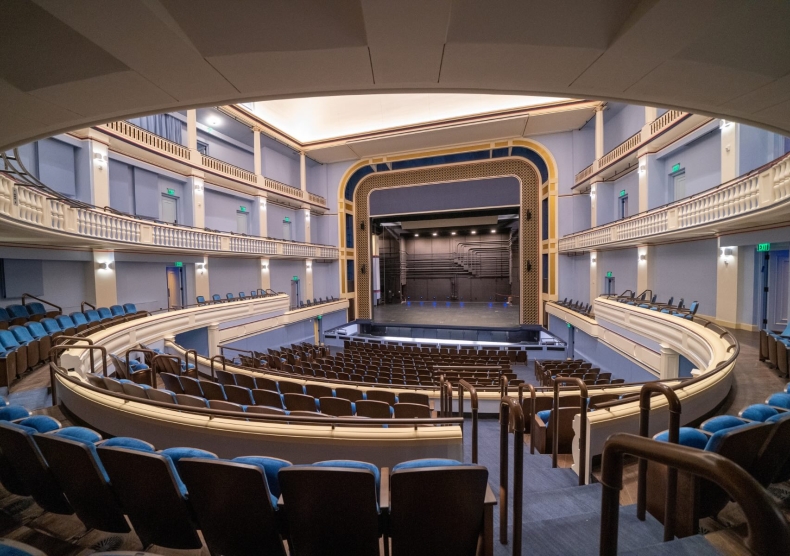
July 31, 2025 | Written by Lauren Ross
The opera department at Rice University’s Shepherd School of Music has been shaped by a lineage of passionate leaders and a commitment to top-of-the-line mentorship for students. In just 41 years, the Shepherd School transformed its opera department from modest beginnings into one of the nation’s premier powerhouses – fueled by visionary leadership that empowers students to reach their highest potential.
In 1984, the opera program formed under Anthony Addison. A true jack-of-all-trades, Addison handled all things opera, from conducting and staging to lighting and costumes. At the time, productions were small in scale and held in unconventional spaces around campus – even including the former home of the Bonner Nuclear Laboratory. In 1986, the opera department put on its first fully staged production of Robert Ward’s The Crucible in Hamman Hall, alongside the Shepherd School Symphony Orchestra.
When Shepherd gained a dedicated building at Alice Pratt Brown Hall in 1991, a shift towards a more structured approach for the opera department began as the technical demands of opera productions outgrew the smaller campus spaces.
Under Dean Michael Hammond, the opera program was run largely by vocal faculty, with Debra Dickinson heading the Opera Workshop and Advanced Opera Studies (AOS) classes. Throughout her 30 years at Shepherd, Dickinson had a lasting impact and mentored many students, including two-time Grammy award winning mezzo-soprano Sasha Cooke (’04).
In 2005, under Dean Robert Yekovich, Richard Bado became Director of Opera Studies. That era marked a turning point for the program – in order to attract top talent by offering competitive scholarship support, the program became more selective, limiting enrollment to just around 20 master’s students. This strategic change helped elevate Shepherd’s reputation and draw exceptional young artists to the school.
With Bado’s extensive opera conducting background and a clear vision for the future, Bado brought a welcomed structure to the department, laying the groundwork for the program as it exists today. Alongside Shepherd’s first-rate vocal faculty, Bado elevated both the artistic quality and strategic focus of the department over his 12-year tenure. Notable students from this era include mezzo-soprano Jennifer Johnson Cano (’08), bass-baritone Nicholas Brownlee, soprano Lauren Snouffer ('09), baritone Michael Sumuel ('09), and tenor Brenton Ryan ('11).
After Bado’s departure in 2017, the department entered a new chapter with the arrival of Michael Heaston as Director of Opera Studies in 2018. Heaston – now Deputy General Manager at The Metropolitan Opera – brought with him strong industry connections from Houston Grand Opera and the wider opera world. Though his tenure was brief, it marked a period of national exposure for students.
Heaston was followed by Miah Im in 2020, a brilliant musician and educator whose energy and ambition inspired a new era of student-centered learning, even amid the COVID-19 pandemic. During her tenure, Patrick Diamond ran the Opera Workshop and AOS. Miah Im’s sudden passing in 2021 was deeply felt across the community.
Principal Coach of Opera Studies Bethany Self served as interim director for two years, keeping the program thriving with warmth and care. A beloved pianist and coach at Shepherd, Self collaborated with faculty and staff to mount full opera productions and support students through the transition.
2023 ushered in a new era with Joshua Winograde, whose extensive experience in artistic planning and as director of the renowned Young Artist Program at Los Angeles Opera brought a new focus on real-world preparation. Under Winograde’s leadership, the redeveloped program now emphasizes professional readiness through mock auditions, guest artist master classes, and personalized mentorship from industry professionals.
Today, the Shepherd School opera department reflects the vision, care, and artistry of each era before it. In just over four decades, it became one of the nation’s top programs, poised to shape the future of opera for generations to come.
The Shepherd School opera program would not be what it is today without its remarkable vocal faculty over the years: Frances Bible, Lynn Griebling Moores, Norma Newton, Jeannette Lombard, Virginia Babikian, William Murray, Joyce Farwell, Kathleen Kaun, Susanne Mentzer, Stephen King, Barbara (Paver) Clark, Robin Rice, Nova Thomas, and Ana María Martínez. The directors of the Rice Chorale also played a role in supporting vocal students: Donald Strong, Gwyn Richards, George Lynn, Frank McKinley, and Tom Jaber.
